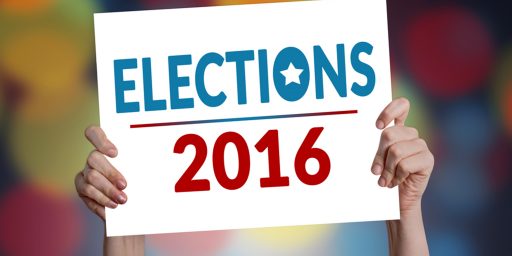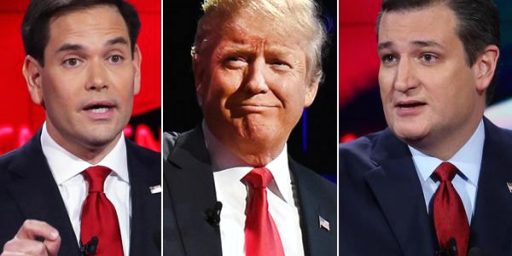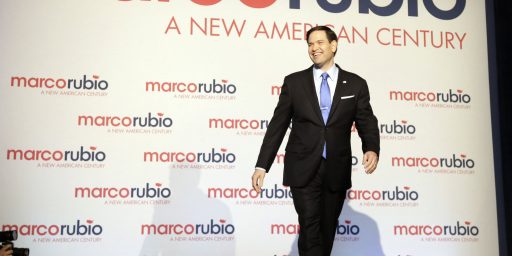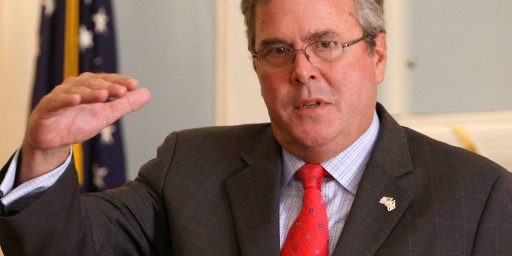National Primary?
Frustrated at having tiny states like Iowa and New Hampshire effectively decide who both parties’ presidential nominees are every cycle, California and Florida are both strongly considering moving their primaries toward the front. Dan Conley is not enthusiastic.
If you ever wanted a plan for ensuring that only the richest candidates had a shot at winning the nomination and that no issues would be discussed in any depth whatsoever, this would be the perfect end result.
If we’re going to run campaigns this way, we might as well have every state hold a national primary and get it all over with on one day. Because this is ridiculous.
So, we’re better off having candidates spend a year eating pancakes with the same twenty-seven people in Nashua?
Indeed, I would argue that “only the richest candidates had a shot at winning the nomination and that no issues would be discussed in any depth whatsoever” perfectly describes the status quo, not some post-apocalyptic future.
The idea that candidates build name recognition in Iowa and New Hampshire and then slowly build momentum as the process moves on is a quaint one but largely mythological. Since Jimmy Carter in 1976, has any candidate emerged as a major party nominee who wasn’t an early front-runner and well-heeled? Certainly, the nominees in the past several cycles have all been early front runners.
A national primary in, say, March, with a run-off in, say, June, would be much preferable to the way we do it now. If a candidate got 50% of the vote, he’d be the nominee. If not, the top two candidates would run against one another for another six to eight weeks.
That would force everyone to engage in retail politics on the issues rather than hanging around Merrimack Restaurant with the locals. And it would virtually guarantee substantive campaigning would continue into the early summer since only shoo-ins such as sitting presidents would likely capture a majority in a multi-candidate race.






This is right on. Remember back to the 2000 Republican primary, some of the most experienced candidates dropped out BEFORE there was even an election anywhere explicitly because they couldn’t raise the cash. All of the party’s money went behind Bush. McCain was only able to make a run for it because of the power of a then-nascent internet.
If you really want to change this, keep the primary schedule undecided until 4Q2007. Candidates would have to run a national “pre-campaign” because there would only be a 1 in 50 chance that any particular state would be first. Then you would have about 4 months of local campaign for the lucky first state and the rest would unfold as before.
Good post.
My issue with a national primary is candidates could focus on the big states and not worry too much about the small states, and just rely on name recognition and ads. Sort of the same reason I am not all the keen on ditching the electoral college for a national majority gets the win election.
Also, once problem with a national primary-at least for NH is that NH law states they will hold the first primary.
Although the idea of having several dates, and randomly choosing which states hold primary or caucus for each date may solve more first concern, because candidates couldn’t cherry pick easily which states they wanted to concentrate on.
One thing I would like to see is the primary season made shorter-going from Jan to June is too long. March to June would be more suitable, although I am not sure the states with Jan or Feb dates would give them up.
Why is this a big deal? The small states are basically freeloaders who are getting a “democracy subsidy” anyway because of the lunacy of the electoral college.
The EC was a product of the same racist impulse that birthed the Three-Fifths compromise. It is shameful that it hasn’t been amended out of existence.
Still sour grapes, Triumph? Gore lost.
When I was in grad school long ago (OK more than 20 years ago), one of my professors (a leading scholar on US parties) circulated a draft paper entitled something like, “Is it time for a national primary?” The answer was yes then and is still now. Indeed, those with the money and name recognition are already in the driver’s seat, and the notion that the sequential primary season with small states coming first will let a “dark horse” win is a quaint notion that never had much basis in reality (as Steven Taylor noted at PoliBlog this morning).
I was going to respond to “just me” but I couldn’t really say much more than “Triumph” already said.
LJD: “Gore lost.” Yes, in the only vote count that mattered that year: The one on the Supreme Court (which the Framers–for all their other bad compromises on the national executive in order to appease small states that would have bolted the union rather than agree to democratic elections–smartly never gave any role in presidential selection).